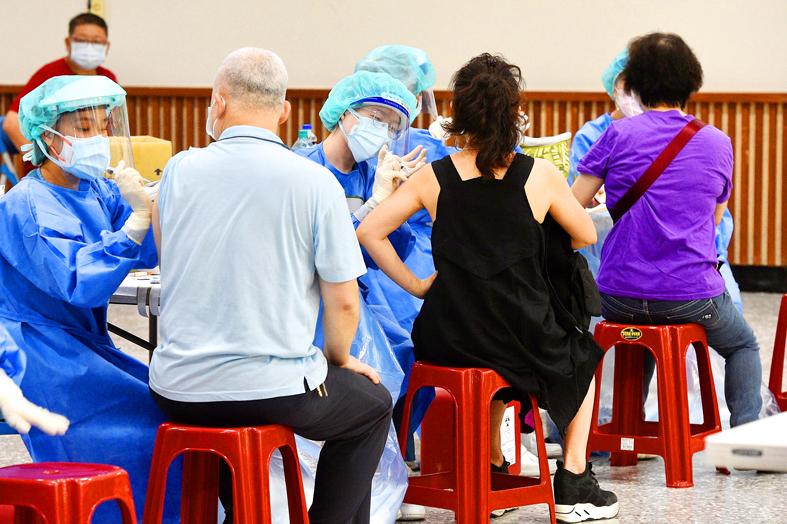Inoculation of government officials with a second dose of COVID-19 vaccine should be postponed to allow more people to get their first shot, Taiwan People’s Party Legislator Tsai Pi-ru (蔡壁如) wrote on Facebook yesterday.
Taiwan has thus far received 8.9 million vaccine doses, but it is a long way until all its 23 million residents are inoculated, she said.
It is crucial to allow every Taiwanese to get their first shot, she said, adding that the second doses for government officials in the second vaccine priority group should be postponed.

Photo: George Tsorng, Taipei Times
Tsai has worked as a nurse at National Taiwan University Hospital’s intensive care unit. Taipei Mayor Ko Wen-je (柯文哲) worked as surgeon at the same hospital before he assumed office in 2014.
The Central Epidemic Command Center (CECC) gives “important government officials necessary for maintaining disease prevention work” second-highest COVID-19 vaccine priority.
The second priority group includes 160,000 people, of whom more than 10,000 work for central government agencies, including the Presidential Office, National Security Council, Executive Yuan and subordinate agencies, as well as the CECC, Tsai said.
Central government officials who are not deployed in hospitals or pandemic hot spots, and do not deal with COVID-19 patients, should not get their second dose before frontline healthcare workers, she said, adding that the CECC should reserve the Moderna COVID-19 vaccine for them.
The AstraZeneca COVID-19 vaccine should be reserved for priority group members who have not received their first dose, she said.
The government should work toward inoculating the largest number of people possible, including foreign residents, with the AstraZeneca jab.
In general, the second dose should be given 12 weeks after the first, but frontline healthcare workers should receive the second dose as early as permitted by the vaccine’s respective guidelines, she said.
No individual is safe until every resident is vaccinated, she said.
Tsai also echoed Ko’s argument that people should be allowed to receive two doses of different vaccine brands, saying that Taiwan’s vaccine supply is unstable.
The University of Oxford has studied inoculations with different vaccine brands, she said, adding that it has completed a study on the combination of the AstraZeneca and the BioNTech vaccines.
The university is working on a study on the combination of the AstraZeneca and the Moderna vaccines, she said.
Some countries, including Germany and Iceland, have approved second-dose vaccinations with the BioNTech or Moderna jabs, following the AstraZeneca vaccine, she said, adding that Taiwan should follow that example.

A decision to describe a Chinese Ministry of Foreign Affairs statement on Singapore’s Taiwan policy as “erroneous” was made because the city-state has its own “one China policy” and has not followed Beijing’s “one China principle,” Deputy Minister of Foreign Affairs Tien Chung-kwang (田中光) said yesterday. It has been a longstanding practice for the People’s Republic of China (PRC) to speak on other countries’ behalf concerning Taiwan, Tien said. The latest example was a statement issued by the PRC after a meeting between Singaporean Prime Minister Lawrence Wong (黃循財) and Chinese President Xi Jinping (習近平) on the sidelines of the APEC summit

Taiwan’s passport ranked 34th in the world, with access to 141 visa-free destinations, according to the latest update to the Henley Passport Index released today. The index put together by Henley & Partners ranks 199 passports globally based on the number of destinations holders can access without a visa out of 227, and is updated monthly. The 141 visa-free destinations for Taiwanese passport holders are a slight decrease from last year, when holders had access to 145 destinations. Botswana and Columbia are among the countries that have recently ended visa-free status for Taiwanese after “bowing to pressure from the Chinese government,” the Ministry

HEALTHCARE: Following a 2022 Constitutional Court ruling, Taiwanese traveling overseas for six months would no longer be able to suspend their insurance Measures allowing people to suspend National Health Insurance (NHI) services if they plan to leave the country for six months would be abolished starting Dec. 23, NHIA Director-General Shih Chung-liang (石崇良) said yesterday. The decision followed the Constitutional Court’s ruling in 2022 that the regulation was unconstitutional and that it would invalidate the regulation automatically unless the NHIA amended it to conform with the Constitution. The agency would amend the regulations to remove the articles and sections that allow the suspension of NHI services, and also introduce provisional clauses for those who suspended their NHI services before Dec. 23, Shih said. According to

‘SIGN OF DANGER’: Beijing has never directly named Taiwanese leaders before, so China is saying that its actions are aimed at the DPP, a foundation official said National Security Bureau (NSB) Director-General Tsai Ming-yen (蔡明彥) yesterday accused Beijing of spreading propaganda, saying that Chinese President Xi Jinping (習近平) had singled out President William Lai (賴清德) in his meeting with US President Joe Biden when talking about those whose “true nature” seek Taiwanese independence. The Biden-Xi meeting took place on the sidelines of the APEC summit in Peru on Saturday. “If the US cares about maintaining peace across the Taiwan Strait, it is crucial that it sees clearly the true nature of Lai and the ruling Democratic Progressive Party (DPP) in seeking Taiwanese independence, handles the Taiwan question with extra